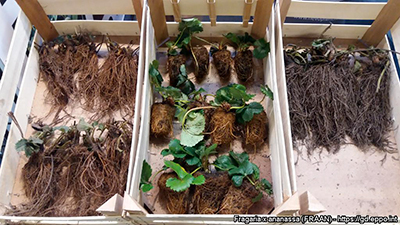
EU Project on Regulated Non-Quarantine Pests (RNQP) – RNQP Project part 2
November 2023 – November 2025
Grant agreement SANTE/2023/NP/0030-SI2.904411
In 2016-2018, EPPO led a project on Regulated Non-Quarantine Pests (RNQPs) for the EU (below referred to as the ‘RNQP Project part 1’. This project included the development of a methodology for assessing the RNQP status of pests, as well as the implementation of that methodology to candidate organisms identified for various sectors. However, the RNQP Project part I did not include the assessment of pest/host combinations from the EU fruit Marketing Directives (Regulation 2008/90/EC and its implementing Regulation 2014/98/EU) which had been recently updated.
As a logical continuation of the RNQP Project part I, a grant agreement was signed on 2023-10-15 with the European Commission for the RNQP Project part II. This project will assess the potential RNQP status of the pests listed in the EU Fruit Marketing Directives (about 147 pests – 414 pest/host combinations, including some additional hosts) as well as some additional pests for other sectors (10 new pests – 14 pest/host combinations). The same methodology as developed during the RNQP Project part 1 will be applied, benefiting from the expertise in EU as well as in non-EU EPPO countries.
The results from this 2-year project will be endorsed as a recommendation to the 27 EPPO countries which are also EU Member States. The information collated during the project will also be of relevance and benefit to other EPPO countries, for the revision of EPPO Standards for the production of healthy planting material (EPPO Standards series PM 4).

Actinidia deliciosa plants for planting (Credit: C. Picard)

Fragaria x ananassa plants for planting (Credit: M. Suffert)
Outline of the project
The RNQP Project part 2 includes the following steps:
- A call for evidence from EU Member States and stakeholders (questionnaire) to gather information on the value of plant reproductive material in specific sectors in each Member State, evaluate pests not precisely defined in the EU Marketing Directives (e.g. pests not listed at species level), and identify current issues with management of risks from these organisms, including any problems with thresholds defined.
- Two Fruit sector-Expert working groups to apply the methodology in relation to the fruit sector and direct exchanges with experts for other sectors.
- Consultation of EPPO Countries and Stakeholders on draft results.
- An additional Expert Working Group to check outputs on consistency and resolve remaining difficult issues.
- Endorsement by the EPPO Working Party on Phytosanitary Regulations and the EPPO Council of the resulting list of RNQPs.
